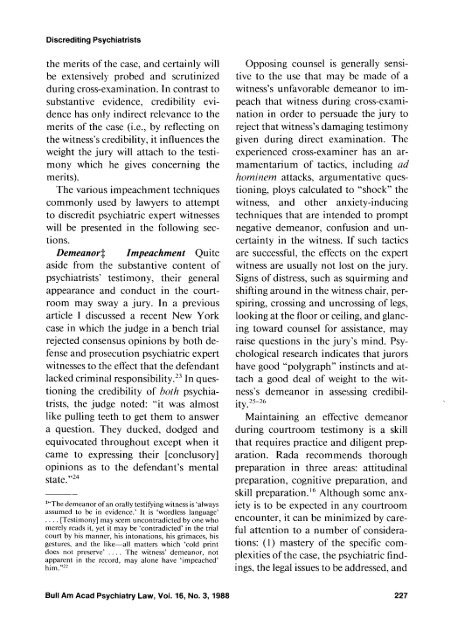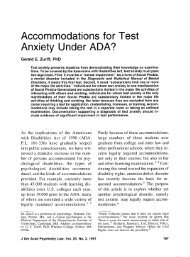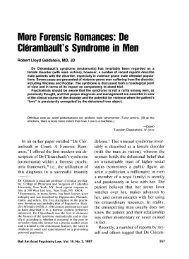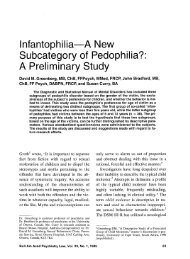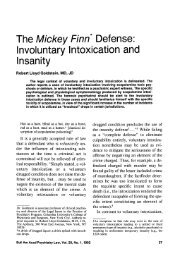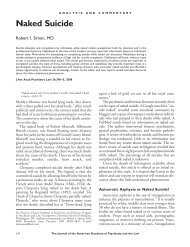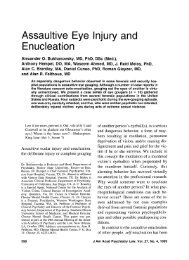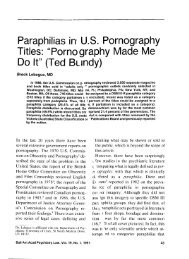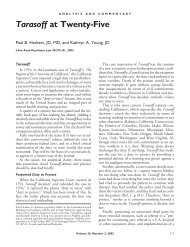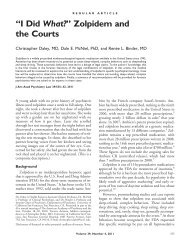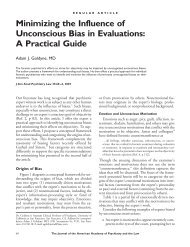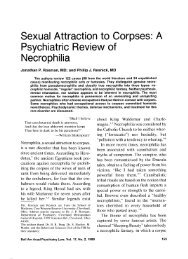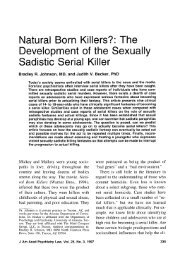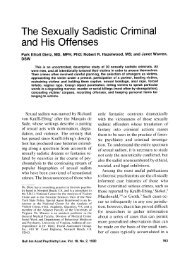Psychiatrists in the Hot Seat*: Discrediting Doctors by Impeachment ...
Psychiatrists in the Hot Seat*: Discrediting Doctors by Impeachment ...
Psychiatrists in the Hot Seat*: Discrediting Doctors by Impeachment ...
You also want an ePaper? Increase the reach of your titles
YUMPU automatically turns print PDFs into web optimized ePapers that Google loves.
Discredit<strong>in</strong>g <strong>Psychiatrists</strong><br />
<strong>the</strong> merits of <strong>the</strong> case, and certa<strong>in</strong>ly will<br />
be extensively probed and scrut<strong>in</strong>ized<br />
dur<strong>in</strong>g cross-exam<strong>in</strong>ation. In contrast to<br />
substantive evidence, credibility evidence<br />
has only <strong>in</strong>direct relevance to <strong>the</strong><br />
merits of <strong>the</strong> case (i.e., <strong>by</strong> reflect<strong>in</strong>g on<br />
<strong>the</strong> witness's credibility, it <strong>in</strong>fluences <strong>the</strong><br />
weight <strong>the</strong> jury will attach to <strong>the</strong> testimony<br />
which he gives concern<strong>in</strong>g <strong>the</strong><br />
merits).<br />
The various impeachment techniques<br />
commonly used <strong>by</strong> lawyers to attempt<br />
to discredit psychiatric expert witnesses<br />
will be presented <strong>in</strong> <strong>the</strong> follow<strong>in</strong>g sections.<br />
Demeanor$ <strong>Impeachment</strong> Quite<br />
aside from <strong>the</strong> substantive content of<br />
psychiatrists' testimony, <strong>the</strong>ir general<br />
appearance and conduct <strong>in</strong> <strong>the</strong> courtroom<br />
may sway a jury. In a previous<br />
article I discussed a recent New York<br />
case <strong>in</strong> which <strong>the</strong> judge <strong>in</strong> a bench trial<br />
rejected consensus op<strong>in</strong>ions <strong>by</strong> both defense<br />
and prosecution psychiatric expert<br />
witnesses to <strong>the</strong> effect that <strong>the</strong> defendant<br />
lacked crim<strong>in</strong>al re~ponsibility.~~ In question<strong>in</strong>g<br />
<strong>the</strong> credibility of both psychiatrists,<br />
<strong>the</strong> judge noted: "it was almost<br />
like pull<strong>in</strong>g teeth to get <strong>the</strong>m to answer<br />
a question. They ducked, dodged and<br />
equivocated throughout except when it<br />
came to express<strong>in</strong>g <strong>the</strong>ir [conclusory]<br />
op<strong>in</strong>ions as to <strong>the</strong> defendant's mental<br />
~tate."'~<br />
*"The demeanor of an orally testify<strong>in</strong>g witness is 'always<br />
assumed to be <strong>in</strong> evidence.' It is 'wordless language'<br />
. . . . [Testimony] may seem uncontradicted <strong>by</strong> one who<br />
merely reads it, yet it may be 'contradicted' <strong>in</strong> <strong>the</strong> trial<br />
court <strong>by</strong> his manner, his <strong>in</strong>tonations, his grimaces, his<br />
gestures, and <strong>the</strong> like-all matters which 'cold pr<strong>in</strong>t<br />
does not preserve' . . . . The witness' demeanor, not<br />
apparent <strong>in</strong> <strong>the</strong> record, may alone have 'impeached'<br />
him,""<br />
Oppos<strong>in</strong>g counsel is generally sensi-<br />
tive to <strong>the</strong> use that may be made of a<br />
witness's unfavorable demeanor to im-<br />
peach that witness dur<strong>in</strong>g cross-exami-<br />
nation <strong>in</strong> order to persuade <strong>the</strong> jury to<br />
reject that witness's damag<strong>in</strong>g testimony<br />
given dur<strong>in</strong>g direct exam<strong>in</strong>ation. The<br />
experienced cross-exam<strong>in</strong>er has an ar-<br />
mamentarium of tactics, <strong>in</strong>clud<strong>in</strong>g ad<br />
horn<strong>in</strong>ern attacks, argumentative ques-<br />
tion<strong>in</strong>g, ploys calculated to "shock" <strong>the</strong><br />
witness, and o<strong>the</strong>r anxiety-<strong>in</strong>duc<strong>in</strong>g<br />
techniques that are <strong>in</strong>tended to prompt<br />
negative demeanor, confusion and un-<br />
certa<strong>in</strong>ty <strong>in</strong> <strong>the</strong> witness. If such tactics<br />
are successful, <strong>the</strong> effects on <strong>the</strong> expert<br />
witness are usually not lost on <strong>the</strong> jury.<br />
Signs of distress, such as squirm<strong>in</strong>g and<br />
shift<strong>in</strong>g around <strong>in</strong> <strong>the</strong> witness chair, per-<br />
spir<strong>in</strong>g, cross<strong>in</strong>g and uncross<strong>in</strong>g of legs,<br />
look<strong>in</strong>g at <strong>the</strong> floor or ceil<strong>in</strong>g, and glanc-<br />
<strong>in</strong>g toward counsel for assistance, may<br />
raise questions <strong>in</strong> <strong>the</strong> jury's m<strong>in</strong>d. Psy-<br />
chological research <strong>in</strong>dicates that jurors<br />
have good "polygraph" <strong>in</strong>st<strong>in</strong>cts and at-<br />
tach a good deal of weight to <strong>the</strong> wit-<br />
ness's demeanor <strong>in</strong> assess<strong>in</strong>g credibil-<br />
ity .25-2"<br />
Ma<strong>in</strong>ta<strong>in</strong><strong>in</strong>g an effective demeanor<br />
dur<strong>in</strong>g courtroom testimony is a skill<br />
that requires practice and diligent prep-<br />
aration. Rada recommends thorough<br />
preparation <strong>in</strong> three areas: attitud<strong>in</strong>al<br />
preparation, cognitive preparation, and<br />
skill preparation.16 Although some anx-<br />
iety is to be expected <strong>in</strong> any courtroom<br />
encounter, it can be m<strong>in</strong>imized <strong>by</strong> care-<br />
ful attention to a number of considera-<br />
tions: (1) mastery of <strong>the</strong> specific com-<br />
plexities of <strong>the</strong> case, <strong>the</strong> psychiatric f<strong>in</strong>d-<br />
<strong>in</strong>gs, <strong>the</strong> legal issues to be addressed, and<br />
Bull Am Acad Psychiatry Law, Vol. 16, No. 3, 1988 227


